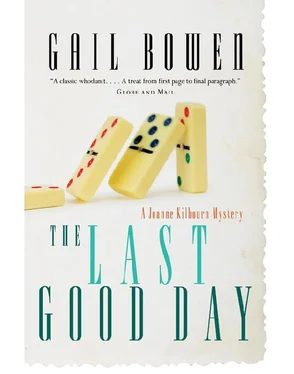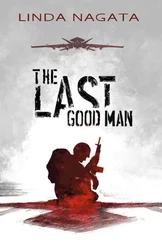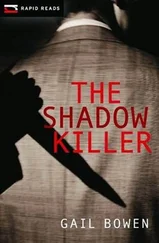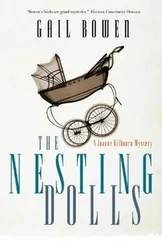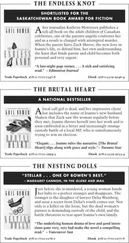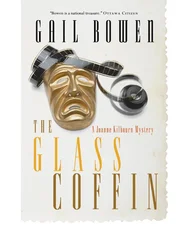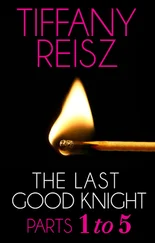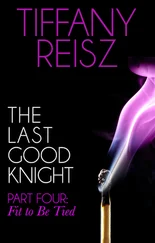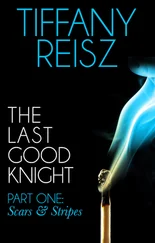Gail Bowen - The Last Good Day
Здесь есть возможность читать онлайн «Gail Bowen - The Last Good Day» весь текст электронной книги совершенно бесплатно (целиком полную версию без сокращений). В некоторых случаях можно слушать аудио, скачать через торрент в формате fb2 и присутствует краткое содержание. Жанр: Классический детектив, на английском языке. Описание произведения, (предисловие) а так же отзывы посетителей доступны на портале библиотеки ЛибКат.
- Название:The Last Good Day
- Автор:
- Жанр:
- Год:неизвестен
- ISBN:нет данных
- Рейтинг книги:4 / 5. Голосов: 1
-
Избранное:Добавить в избранное
- Отзывы:
-
Ваша оценка:
- 80
- 1
- 2
- 3
- 4
- 5
The Last Good Day: краткое содержание, описание и аннотация
Предлагаем к чтению аннотацию, описание, краткое содержание или предисловие (зависит от того, что написал сам автор книги «The Last Good Day»). Если вы не нашли необходимую информацию о книге — напишите в комментариях, мы постараемся отыскать её.
The Last Good Day — читать онлайн бесплатно полную книгу (весь текст) целиком
Ниже представлен текст книги, разбитый по страницам. Система сохранения места последней прочитанной страницы, позволяет с удобством читать онлайн бесплатно книгу «The Last Good Day», без необходимости каждый раз заново искать на чём Вы остановились. Поставьте закладку, и сможете в любой момент перейти на страницу, на которой закончили чтение.
Интервал:
Закладка:
Zack beamed. “All I ever asked for was a fair hearing. So, some context. Guilt is a powerful force, Joanne. It plays havoc with the judicial system. People are always confessing to big things because they’re tortured with guilt about little things.”
“And you think that’s what Chris did here tonight.”
“I’ve caught his act before,” Zack said acidly. His face softened. “Chris is a thoroughly decent man, but at the moment he can’t be trusted. He’s hit a bad patch in his life. He was forced to do something that was necessary but morally repugnant. Not to put too fine a point on it, it’s fucking him up. For his sake, for all our sakes, forget everything he said to you.”
“Okay,” I said.
“Just like that?” Zack said.
“Just like that,” I said. “I don’t know what’s going on. If I involve myself, I could do more harm than good, and Chris said he didn’t want to draw anyone else in.”
Zack’s head shot around. “Did he explain what he meant?”
“No.”
“And you didn’t push it. You surprise me,” he said. “But you also make me understand why Kevin was willing to trust you.” He gestured gracefully at the ramp to the gazebo. “Shall we rejoin the festivities?”
“Sure,” I said. “When it comes to fireworks, there are no second chances.”
By the time we got back, the party was rocking. The bonfire was burning hot and high, the music was pounding, and the dancers’ movements had taken on a shank-of-the-evening abandon. My son Angus and his girlfriend, Leah, were on a bench near the fire. Hair still wet from swimming and hands gripping cans of beer, they were huddled under a beach towel, laughing at some private joke. When he spotted Zack and me, Angus waved and pointed at Taylor and her new friends, Gracie Falconer and Isobel Wainberg. The girls were up to their ankles in the lake, giggling and shrieking as the water splashed their shorts. Rose Lavallee, the tiny ageless woman who was Gracie’s nanny, had planted a folding chair at the water’s edge and was eyeing them fixedly.
“Everybody’s happy. Everybody’s safe,” Zack said. “Now why don’t we get a drink and join the others.”
There were perhaps eighty people at the Canada Day party. No one appeared to be in charge of seating arrangements, yet as the first rocket spiralled into the sky and rained down its shower of fiery stars, my kids and I found ourselves alone with the Falconer Shreve families in what was, indisputably, the choicest location on the beach. It was an exercise in self-selection that would have interested a sociologist. Taylor wasn’t a sociologist, but she was a keen observer. “How come no one’s here but us?” she asked.
“Because it’s our party,” Zack Shreve said. “And that means we get the best of everything.”
Maybe so, but as I looked at the faces around me, it seemed that getting the best of everything didn’t bring happiness.
Dressed in a black T-shirt, slacks, and sandals, Delia Wainberg was a striking figure: sapling thin, with pale, pale skin, piercing cobalt-blue eyes, and wiry black hair so wild it seemed electrically charged. When I’d driven through the gates to Lawyers’ Bay for the first time, it had been Delia who had waved me over to welcome me. It was hard to imagine a less likely representative of cottage life. She was painfully intense – even jumpy – but she had a Cheshire cat grin that was infectious.
That night the Cheshire cat grin was nowhere in evidence. As she surveyed the world through the screen of blue smoke that drifted from her cigarette, Delia clearly didn’t like what she saw. As soon as Chris Altieri walked onto the beach, the root of her preoccupation was obvious. She went to him immediately, and when her efforts to engage him in conversation failed, she ground out her cigarette and slid her arms around his waist. It was as if she believed that if she held on tight enough, she could keep him safe.
A stone’s throw away, Noah Wainberg tended the bonfire and listened as his daughter and her friends fizzed with gossip and dreams. Kevin had told me Noah was the unofficial handyman of Lawyers’ Bay, the one to call in the middle of the night if the toilet wouldn’t stop filling or if the new flat-screen TV short-circuited the wiring. In a world fuelled by high-powered, high-paid talent, Noah had made himself indispensable. He was the fix-it man.
He was also an artist. The grounds of every home at Lawyers’ Bay were blessed with Noah’s wood carvings. Large and roughly hewn, these images of animals, real and fanciful, surprised you by their power. To look at his work was to feel, for an instant, the deep and numbing love that can drive a man to make art. His love for his wife also appeared to be deep and numbing. That night, as he piled logs on the bonfire while she obsessed over another man, it was impossible to read the feelings that lay behind his fire-reflecting eyes.
Their daughter, Isobel, was her mother in miniature, tightly wound and passionate. At eleven, she was already a worrier, her young brow knit in a permanent frown. I’d noticed at dinner that she had a number of tics: a need to align her knife, fork, and napkin just so; an obsession with keeping her clothes and her person spotless, and her hair, electric like her mother’s, tightly braided. Despite all this, she was good company: intelligent, articulate, and sensitive.
While Isobel crackled with fretful intensity, her best friend, Gracie Falconer, loped through life with a bounce and a grin. She was, in every sense, her father’s child, big-boned, auburn-haired, ruddily freckled, and effortlessly charming. Like her father, she seemed able to shrug off the slings and arrows without breaking a sweat.
It was a gift Blake Falconer must have been grateful for that night because his wife was clearly and publicly furious with him. At some point between Lily’s water-skiing tour de force and dinner, the Falconers had apparently quarrelled, and their simmering war had drawn furtive glances all evening. Blake’s efforts at peacemaking now were greeted with stony silence, and when he tried an offhanded hug, Lily removed his hand from her bronze shoulder with icy distaste. “I said I’d handle this, and I will,” she said, and she looped her long black hair into a knot and stalked off to join Rose Lavallee.
Gracie watched her mother walk away, then wandered over to her father. Together, they tilted their heads to follow the trajectory of a pink and purple rocket. It was so spectacular that Gracie reached out exuberantly to hug her father.
“Cool,” they said in unison; then laughed at the moment.
“Why can’t she ever just see how nice everything is?” Gracie asked.
Blake shrugged and gave his daughter a rueful smile. “That,” he said, “is a question I’ve asked myself for years.”
As always, the fireworks were over too soon. The last star arced across the sky, the last lovely parabola of light faded, and the night was suddenly dark and cheerless. For a beat, we stood uncertainly, breathing in air wisped with smoke and pungent with bug spray. Then people began to fold blankets, collapse chairs, and say their goodbyes.
“Why does it have to be over so soon?” Taylor asked plaintively.
“Do you like riddles?” Chris Altieri’s voice startled me. I had no idea he’d slipped away from Delia and joined us. He’d caught Taylor by surprise, too.
“Where did you come from?” she asked.
“I wanted to stand where I could get the best view of the big finish,” he said.
“It was neat, eh?” Taylor said.
“Very neat,” Chris said. “But you didn’t answer my question. Do you like riddles?”
“Sure – as soon as someone tells me the answer,” Taylor said. “My brother’s a lot better at stuff like that than I am.”
Читать дальшеИнтервал:
Закладка:
Похожие книги на «The Last Good Day»
Представляем Вашему вниманию похожие книги на «The Last Good Day» списком для выбора. Мы отобрали схожую по названию и смыслу литературу в надежде предоставить читателям больше вариантов отыскать новые, интересные, ещё непрочитанные произведения.
Обсуждение, отзывы о книге «The Last Good Day» и просто собственные мнения читателей. Оставьте ваши комментарии, напишите, что Вы думаете о произведении, его смысле или главных героях. Укажите что конкретно понравилось, а что нет, и почему Вы так считаете.
